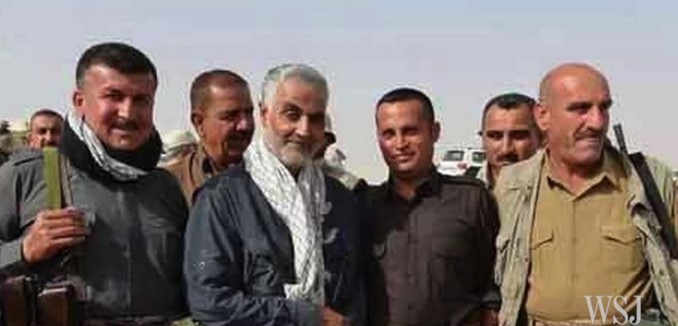America’s strategy in fighting the Islamic State of Syria and Iraq (ISIS) has become “increasingly dependent on Iranian fighters,” according to an analysis published Friday in The New York Times.
In the four days since Iranian troops joined 30,000 Iraqi forces to try to wrest Saddam Hussein’s hometown of Tikrit back from Islamic State control, American officials have said the United States is not coordinating with Iran, one of its fiercest global foes, in the fight against a common enemy.
That may be technically true. But American war planners have been closely monitoring Iran’s parallel war against the Islamic State, also known as ISIS or ISIL, through a range of channels, including conversations on radio frequencies that each side knows the other is monitoring. And the two militaries frequently seek to avoid conflict in their activities by using Iraqi command centers as an intermediary. …
“The only way in which the Obama administration can credibly stick with its strategy is by implicitly assuming that the Iranians will carry most of the weight and win the battles on the ground,” said Vali R. Nasr, a former special adviser to Mr. Obama who is now dean of the School of Advanced International Studies at Johns Hopkins University. “You can’t have your cake and eat it too — the U.S. strategy in Iraq has been successful so far largely because of Iran.”
The Times article cites a number of battles where Iranian involvement was crucial, including breaking the siege of Amerli, freeing the city of Baiji from ISIS, pushing ISIS away from the Kurdish city of Erbil, and last week’s fight against ISIS in Saddam Hussein’s hometown of Tikrit, where “Iranian-backed Shiite militia leaders said that their fighters made up more than two-thirds of the pro-government force of 30,000.”
The analysis in the Times highlighting Iran’s involvement in Iraq came a day after Secretary of State John Kerry said at a press conference in Saudi Arabia that despite the nuclear talks with Iran, the United States was keeping an eye on the Islamic Republic’s “destabilizing” behavior in the region.
Now, I also want to make clear, as I did in every one of my meetings today: Even as we engage with these discussions with Iran around its nuclear program, we will not take our eye off of Iran’s other destabilizing actions in places like Syria, Lebanon, Iraq, and the Arabian Peninsula – Yemen particularly. And whether or not we are able to reach a deal on the nuclear program, the United States will remain fully committed to addressing the full slate of issues that we have with Iran, including its support for terrorism.
Last week, The Wall Street Journal published a video report (embedded below) of the increasing presence of Iranian Revolutionary Guard Corps—Qods Force commander Qassem Suleimani on social media, portraying it as a sign that Iran wishes to take credit for its involvement in Iraq.
In January, The New York Times reported that the administration was assuring Syrian President Bashar al-Assad, one of Iran’s chief clients, that he was not a target of American military efforts.
While the interests of Iran and the United States may align for now, it may lead to disaster down the road, Jonathan Spyer and Aymenn Jawad Al-Tamimi warn in How Iraq Became a Proxy of the Islamic Republic of Iran, which was published in the December 2014 issue of The Tower Magazine:
For the U.S. and its allies, this may represent a short-term advantage, but it is a long-term threat. The Iranian proxy militias, quite naturally, also embrace Iran’s ideology, which is intensely anti-American, anti-Western, and indeed, anti-Semitic. They parrot, for example, Iran’s official propaganda line, according to which the I.S. is supposedly a creation of “the Great Satan” (i.e., the United States) and/or the Jews.
Nor does the eventual creation, or attempt to create, an Iranian sphere of influence across the Middle East bode well for American or Western interests. However effective they may be in fighting the I.S., Iran’s proxy militias in Iraq are part of this agenda and are helping Iran pursue it.
Thanks to current Western policy, this time they are doing it with Western air support.
[Photo: Wall Street Journal / YouTube ]




